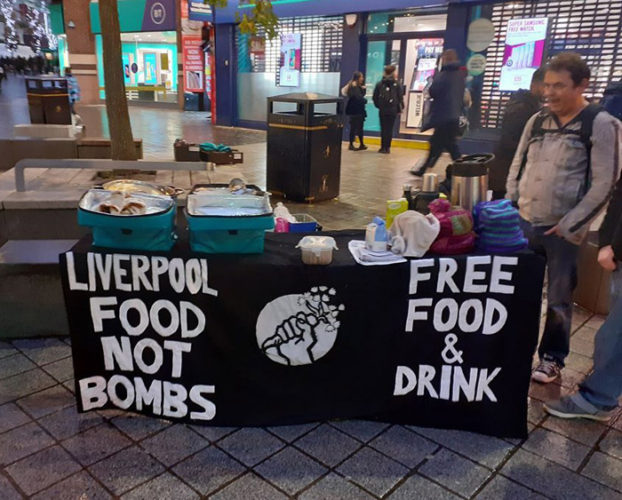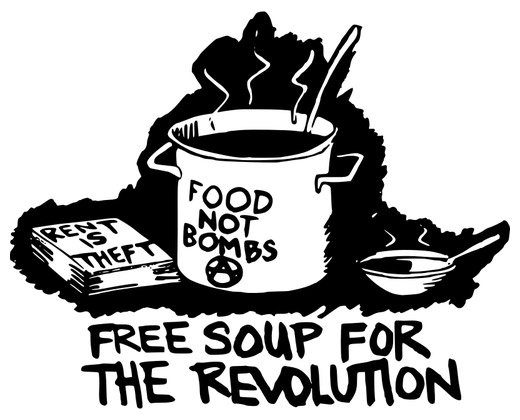Andrew Żywności of Liverpool Food Not Bombs explains the philosophy of the group and how food waste is a serious environmental problem.
Liverpool Food Not Bombs is an autonomous collective of volunteers who cook and give out free food for everyone. We view this as an act of mutual aid rather than ‘charity’. The group has continued to distribute food to hungry people throughout the Covid-19 crisis. Contrary to what we’re led to believe there are still hungry people on the streets. While it’s true that people are being provided with accommodation, they aren’t being given any sustenance to go with it, so are heading into the city centre in search of food and income. We are currently operating on Fridays as well as our regular Tuesdays, expanding our capacity as that of other groups has been reduced.
We believe that food wastage is a serious problem within our current society; it shows a huge contradiction that abundant food can be produced but so many go hungry. This waste doesn’t need to happen. Food is a right not a privilege; we try to help and we point out this contradiction by gathering surplus food that shops are going to throw out, and cook what is still edible. What we cook is vegan, not only to be more friendly to animals and the environment, but also making the food accessible to everyone (as well as a bit healthier).
The first Food Not Bombs group was set up in the USA nearly 40 years ago, by people involved with campaigns against nuclear weapons (hence the ‘not bombs’ in the name), but we are not linked to them other than sharing a name. The first Food Not Bombs group felt it was important that anyone could set up a group, anywhere in the world, and there are now hundreds of groups on many different continents, running independently of each other.
Part of the aim of Liverpool Food Not Bombs is to spread awareness about the commodification of food and how this leads to food waste. Food waste is one of the issues that commonly goes unacknowledged as a factor in climate change. Under capitalism food is produced in great abundance but a significant amount goes to waste due to arbitrary sell by dates or other standards. The forests cleared for farming, the fuels burned for harvesting and transportation, and the labour of planting and putting these products on our shelves all go to waste if the product cannot be sold by a deadline or becomes slightly damaged. A slightly bruised banana, for instance, is perfectly safe to eat or cook with (banana cake is a regular favourite at Liverpool Food Not Bombs!). However, it won’t sell in a supermarket despite the labour and energy put into producing it. Contrary to common belief, the majority of food waste is not created by farmers throwing away “ugly” fruit and vegetables; they are typically processed to make something else (a weird looking strawberry won’t be thrown out for instance, it might be made into jam). Farming has an enormous impact upon the environment; at best we can mitigate this impact but regardless there will still need to be land cleared and energy consumed.
The current state of food wastage in the first world is estimated to be around 100 kilograms per person per year, and mostly at the consumption stage, which means when it is on the shop shelves or when it is bought. Unfortunately, the UK has no policy in place to dis-incentivise food waste. At best, supermarkets will mark down the price of products close to their sell by date. The law stands firmly on the side of wastefulness, as businesses are perfectly within their rights to get rid of as much as they want and ensure no one can use what is thrown out. It is not uncommon to find supermarket bins with their contents covered in bleach or rat poison so that people can’t eat it.
Food waste is a problem endemic to capitalism. All food will eventually succumb to entropy and cannot last on shelves indefinitely, and so long as it comes with a price tag (a ransom demand) some of it will always go to waste. The contradiction of abundant food and an increasingly hungry population would be horrifying enough were it not for the realisation that what gave us this alleged abundance (is it really so abundant if there are still people starving or scraping by?) is also destroying the environment. This is not to say that we should be chastising ourselves every time we don’t finish our dinner, as if environmentalism was a stern parent demanding we finish our sprouts. Finger wagging at those subjected to capitalism’s contradictions won’t change the contradictions. What first needs to be recognised is the political nature of food; it is a basic need that we cannot do without and how people access food is foundational to any economy. Part of what Liverpool Food Not Bombs tries to do is encourage people to think about how and why food is commodified: the fault is in a system that incentivises abundant production but not abundant distribution. If food is so plentiful but its commodification leaves people hungry and wastes precious resources in its development, then why not do away with food as a commodity and distribute it as freely as we distribute water?
We’re always looking for new volunteers to help with all aspects of what we do and will resume our open-door policy for volunteers as soon as we are able. You don’t need to know how to cook! We are currently restricting volunteers to a skeleton crew but do get in touch if you’d like to get involved. At the moment we are giving food out directly to those on the streets rather than via our usual stall on Church Street. This means we have lost our main source of donations which we need to cover the costs of things we have to buy such as cutlery, cleaning products, gloves and sanitiser. If you’d like to make a donation or volunteer, please get in touch via our Facebook page or by emailing us at fnb_at_n2n-request@lists.riseup.net


Permalink
Since this was published we have returned to operating from our stall on Church St and are currently going out only on Thursdays. Please email stevieye@hotmail.com if you have any questions or want to get involved and to be added to our mailing list